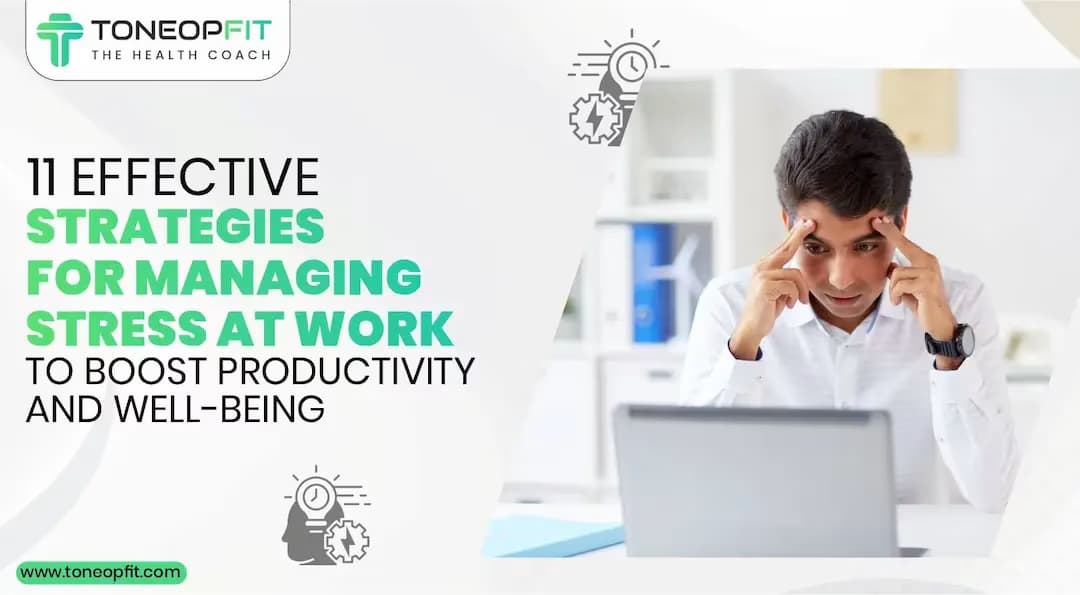Who hasn't experienced the pressure of work stress? Even if you love what you do, any job can be stressful. It's difficult enough to deal with the daily pressure of meeting deadlines and producing results. However, persistently dealing with stress at work is debilitating and detrimental to both your physical and mental well-being. The Indian Psychiatric Society has consistently found that most workers cite work as a significant source of stress.
Stress is "the undesirable response people have to excessive pressures or other demands placed on them." Some people benefit from pressure because it can keep them motivated. However, if the pressure is too much, it can lead to stress.
While stress is not a disease, it can surely affect a person's physical and mental health. Let us dive into this blog to learn ways to manage job stress and 10 ways to reduce stress at work.
Table Of Contents
1. How To Manage Job Stress? 11 Ways To Reduce Stress At Work
3. Expert’s Advice
4. The Final Say
5. FAQs
6. References
How To Manage Job Stress? 11 Ways To Reduce Stress At Work

Occupational stress or work stress has significant health consequences that range from the relatively harmless (such as occasional headaches) to the potentially serious (such as heart attack and metabolic syndrome). Unmanaged stress can hurt your physical and emotional well-being over time.
Additionally, new evidence points to a possible connection between anxiety, depression, and job burnout. A more practical strategy would be to use useful coping mechanisms to lessen the stress of your current position.
Managing stress well in the workplace is important for your overall health. There are many things you can do to manage stress at work, such as:
1. Plan Your Workload
If your workload is causing you stress, think about how much work you can take on.
You may think you have no choice but to rework yourself. However, knowing how to say no can be an important part of managing stress in the workplace. Try to have the confidence to say "no" when you think it's the right decision, even if it's not the most popular choice. State your reasons and offer a solution. For example, you can say that you will work on a new task after finishing another more urgent task.
If you take on too much, you may end up useless. It's better to say no to some tasks so you can better accomplish others. Before you say yes to a job, you can calculate how long you will have to deal with the current workload. This means you can find out if you have any extra capacity.
2. Identify Stress Symptoms And Write Down Your Stressors
Recognising and documenting stressful circumstances can assist you in determining the source of your discomfort. A knock on the back, an uncomfortable workstation, or a lengthy journey are a few examples of minor sources of stress. Maintaining a notebook to record your stressors and responses could be beneficial. You can include things that make you feel a certain way—people, locations, or things that happen to you.
Learn to recognise the physical effects of stress so you can do something about it early.
The main symptoms of stress include:
- Heart palpitations
- Dry mouth
- Headaches
- Peculiar aches and pains
- Loss of appetite
Be aware of the risk of work stress spilling over into other areas of your life. Stress can affect your family life and friendships or your ability to enjoy your hobbies.
3. Talk To Your Employer
Talk to someone you feel comfortable with about how you feel. This could be your manager or someone else in your organisation. Employers have a duty to ensure the health, safety, and well-being of their employees. This is covered by the Health and Safety at Work Act. Employers must also carry out occupational stress risk assessments.
Your employer can make reasonable adjustments to your work. This may include allowing:
- Work from home where possible.
- Take short and frequent breaks.
- Extend the deadlines for completing tasks.
- If your stress isn't work-related, your workplace can still support you. For example, your manager may be able to reduce your workload while you deal with stress in your personal life.
4. Try Stress-Relieving Activities & Relaxation Techniques
You can do some stress relief workouts or follow various relaxation techniques like:
- Mindfulness Meditation: Spend 10-15 minutes focusing on your breath to promote calmness and reduce anxiety.
- Deep Breathing Exercises: Practice deep breathing techniques, like inhaling for 4 seconds and exhaling for 6, to activate relaxation.
- Progressive Muscle Relaxation (PMR): Tense and relax each muscle group to release physical tension and promote overall relaxation.
- Nature Walks: Take a walk in a park or natural setting to lower stress hormones and boost your mood.
- Yoga and Stretching: Yoga for stress management is like a gold standard technique for unwinding after a stressful day, while stretching helps relax your body.
5. Take Time To Recharge
Even a brief period of personal time taken throughout a hectic workday will help you avoid burnout brought on by ongoing stress at work. Throughout the day, you can unwind by watching a humorous YouTube video or listening to an engaging podcast. You can be more productive if you are mentally at ease. It is also essential to take a break from thinking about your work by not checking work emails when free or disconnecting from your phone in the evening.
Also Read: 5 Mental Health Exercises To Boost Concentration Levels And Brain Functioning
6. Work On Your Time Management Skills
Sometimes, your level of organisation determines whether you feel overburdened by work. Try creating a priority list at the beginning of the work week by preparing tasks and ranking them in order of importance.
Allocating dedicated time slots for focused work can also help you overcome procrastination. Try engaging in more tedious or less appealing tasks to get an early sense of relief that will make you feel less stressed for the rest of the day.
7. Maintain Work And Personal Life Balance
Being available 24/7 will burn you out quickly. To avoid potential work-related stress, creating clear boundaries between work and personal life is essential. Part of this is setting aside time to socialise and setting rules for checking email or taking phone calls.
8. Stop Trying To Be Perfect
You naturally want to "go all out" in your career. But try not to be perfect in all aspects of your work. Even the most efficient and hard workers tend to struggle the most with stress. In these situations, your best friend is confidence.
If achieving perfection is your preoccupation, try to master it, regardless of whether you acknowledge that no one is flawless or that there are things that others are better at than you.
Always remember that work done confidently is better than work done under stress!
9. Don't Be Afraid To Ask For Help
First, you need to determine what part of your job needs help and where that help can be found. For example, if you need a new idea for a blog post, find a writer to help you.
The 21st-century workplace is increasingly competitive and stressful. Having a mentor or coach to guide you through your career is more important than ever, especially if you need clarification on your next steps.
10. Take Vacations
Like nothing else, disconnecting or "turning off" from work-related obligations and activities can help you de-stress and rejuvenate. You don't even have to fly a plane around the world. Staying away from work or taking a trip out of town for a few hours will help you reset.
11. Avoid Conflicts With Colleagues
Interpersonal conflicts can damage physical and emotional health. Conflict between coworkers can be hard to escape, so it's a good idea to avoid conflict at work as much as possible. Don't gossip, don't share too much of your personal views on religion and politics, and avoid "off-colour" office humour. If you do find yourself in a conflict, make sure you know how to deal with it appropriately. Developing effective conflict-resolution skills can help prevent minor disputes from becoming major headaches.
Also Read: How To Reduce Stress Naturally? Know Top 7 Yoga Poses For Mental Relaxation
Expert’s Advice
Reducing tension before work can be beneficial, as can upholding a healthy work-life balance. Managing conflict, maintaining order, and creating a comfortable work environment can also be conducive.
Finally, remember to create routines that work for you. With the right strategies, workplace stress can be managed. You can also indulge in stress-relieving exercises like yoga and meditation with ToneOp Fit’s Live Yoga Sessions.
Health Expert
Lavina Chauhan
The Final Say
To conclude this article, managing stress at work is essential for boosting productivity and well-being. Effective strategies, like taking regular breaks, practising mindfulness, and staying organised, can create a healthier work environment.
Remember, small changes can make a big difference in how you feel at work. Prioritise your mental health, and you'll be more focused and energised to tackle your tasks!
FAQs
1. How do you deal with stress at work?
Dealing with stress in the workplace can be challenging, but you must:
- Plan your workload
- Talk to your employer if it is getting challenging for you
- Try stress-relieving activities
2. How do you handle stress at work efficiently?
You can handle stress at work considering:
- Work on time management
- Try to balance personal life and work
- Practice relaxation techniques like yoga and meditation
- Organise your work
- Don’t be afraid to ask for help
3. What are the 5 A's of stress management?
The 5 A's to help you manage stress are:
- Avoid: Some types of stress cannot be avoided, such as stress caused by death, illness or accident.
- Alter: Stress can be caused by situations that you usually deal with as part of your daily routine.
- Adapt: Realise that things happen, plans change, and emergencies happen.
- Accept: You must be prepared to consciously accept that you may experience stress from any source or situation.
- Active: Being active improves memory, mood and sleep and reduces stress and anxiety. Thirty minutes of aerobic exercise increases blood flow to the brain.
References
- https://www.healthline.com/health/work-stress#when-to-seek-help
- https://www.verywellmind.com/how-to-deal-with-stress-at-work-3145273
- https://www.nhsinform.scot/healthy-living/mental-wellbeing/stress/how-to-manage-stress-at-work/
- https://www.acas.org.uk/managing-work-related-stress
- https://www.trinet.com/insights/workplace-stress
- https://www.hrmorning.com/articles/10-ways-to-deal-with-and-manage-work-stress/
- https://www.colorado.edu/law/25-quick-ways-reduce-stress
About ToneOp Fit
ToneOp Fit is a platform dedicated to improving and maintaining good health through a comprehensive range of goal-oriented health plans with up to 3 Coach support. With a range of Weight Management, Medical Condition, Detox Plans, and Face Yoga Plans, the app also provides premium health trackers, recipes and health content. Get customised diet, fitness, naturopathy & yoga plans and transform yourself with ToneOp.










































